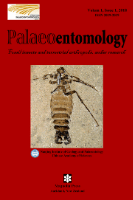
Palaeoentomology
Scope & Guideline
Exploring Fossilized Frontiers: The Science of Insect Evolution
Introduction
Aims and Scopes
- Fossil Insect Taxonomy and Description:
The journal primarily publishes detailed descriptions and classifications of new fossil insect species, often from amber deposits, highlighting their morphological features and systematic positions. - Palaeoecology and Biogeography:
Research often explores the ecological roles of insects in past environments, including plant-insect interactions and the biogeographical distribution of fossil taxa. - Evolutionary Studies:
Studies in the journal frequently examine evolutionary relationships among insect taxa, utilizing both morphological and molecular data to understand lineage divergence and historical biogeography. - Taphonomy and Preservation:
The journal includes investigations into the processes of fossilization and the conditions affecting the preservation of insects in amber and other sedimentary contexts. - Interdisciplinary Approaches:
Palaeoentomology encourages interdisciplinary research, integrating methods from paleontology, entomology, geology, and molecular biology to provide comprehensive insights into ancient ecosystems.
Trending and Emerging
- Amber Studies and New Taxa:
There is an increasing trend in the discovery and description of new taxa from amber sources, particularly from the Cretaceous period, emphasizing the importance of amber as a window into ancient ecosystems. - Phylogenomic Analyses:
Emerging studies utilize phylogenomic techniques to resolve evolutionary relationships, indicating a shift towards integrating molecular data with traditional morphological approaches. - Ecological Interactions and Plant-Insect Dynamics:
Research exploring ancient ecological interactions, particularly between insects and plants, has gained prominence, highlighting the role of insects in historical ecosystems. - Technological Advances in Fossil Analysis:
The use of advanced imaging techniques, such as confocal microscopy and micro-tomography, is becoming more prevalent, allowing for detailed morphological studies and better visualization of fossil structures. - Focus on Rare and Unique Fossils:
There is a growing interest in documenting rare or unique fossil finds, which often provide insights into previously unknown aspects of insect diversity and ecology.
Declining or Waning
- Research on Recent Fossil Discoveries:
There has been a noticeable decrease in studies focused solely on the discovery of new fossil sites or generic descriptions without substantial taxonomic contributions. - Paleobiological Implications from Fossil Insects:
The journal has seen fewer papers that solely discuss broad paleobiological implications without detailed ecological or taxonomic analysis, indicating a shift towards more focused studies. - Historical Insect Diversity Studies:
Research emphasizing historical insect diversity without correlating fossil findings to modern biodiversity trends is less common, suggesting a move towards more integrative studies. - Generalized Reviews of Insect Groups:
Comprehensive reviews of insect groups, particularly those lacking new findings or taxonomic revisions, have become less frequent, indicating a preference for original research with novel contributions.
Similar Journals
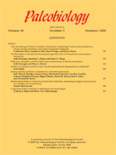
PALEOBIOLOGY
Fostering a Deeper Understanding of Our Planet's PastPALEOBIOLOGY, published by Cambridge University Press, is a premier, peer-reviewed journal that stands at the forefront of research in paleontological sciences. With a robust commitment to advancing the study of the interactions between ancient life forms and their environments, the journal has established itself as a vital resource for researchers, professionals, and students in the fields of paleontology, ecology, and evolutionary biology. Spanning from 1975 to 2024, it boasts an impressive Q1 ranking in several categories, including Agricultural and Biological Sciences, Ecology, and Paleontology, indicative of its high impact and relevance in shaping contemporary scientific discourse. While the journal is not open access, it offers a variety of subscription and access options, ensuring broad distribution and visibility of published research. As a leader in its discipline, PALEOBIOLOGY aims to facilitate a deeper understanding of our planet's biological history, making it an essential publication for anyone interested in the dynamics of life across geological time.

NAUTILUS
Advancing Aquatic Sciences for a Sustainable FutureNAUTILUS is a distinguished journal published by the Bailey-Matthews Shell Museum, dedicated to advancing the understanding of aquatic sciences as well as ecology, evolution, behavior, and systematics. With an ISSN of 0028-1344, NAUTILUS has played a significant role in the scholarly community from its inception, with publication converged between 1996 to 2015 and 2017 to 2024. Although currently categorized as Q4 in Aquatic Science and Ecology, Evolution, Behavior and Systematics for 2023, the journal has a reputation for publishing high-quality research that contributes to the broader scientific discourse. Researchers and students alike can benefit from the insights provided by NAUTILUS, which remains committed to exploring the intricate relationships within aquatic ecosystems. Its editorial management, led by Dr. José H. Leal, ensures rigorous peer review and academic excellence, making it a crucial resource for those dedicated to discovering the complexities of aquatic and ecological research.

European Journal of Taxonomy
Pioneering research in taxonomy and systematics.The European Journal of Taxonomy is a distinguished open access journal, published by the MUSEUM NATL HISTOIRE NATURELLE in France, dedicated to the rich and dynamic field of taxonomy, ecology, and systematics. Since its inception in 2011, this journal has aimed to provide a platform for the dissemination of high-quality research and innovative methods relevant to the study of biodiversity and species classification. With a commendable Q2 ranking in the Ecology, Evolution, Behavior and Systematics category as of 2023, the journal ranks 380 out of 721 in Scopus, highlighting its pivotal role in advancing scientific knowledge in these essential areas. Researchers and students alike will find valuable resources and contributions that address pressing ecological and evolutionary questions from 2015 to 2024. By promoting open access, the European Journal of Taxonomy ensures that vital research is accessible to a broader audience, fostering collaboration and discourse among professionals striving to enhance our understanding of the natural world.
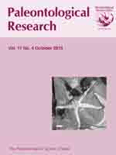
PALEONTOLOGICAL RESEARCH
Charting the Course of Earth's Biological Legacy.PALEONTOLOGICAL RESEARCH, published by the PALAEONTOLOGICAL SOCIETY OF JAPAN, is a prominent peer-reviewed journal that addresses key developments in the field of paleontology, ecology, and evolutionary biology. With an ISSN of 1342-8144, this journal has established itself as a vital resource for researchers and professionals who seek to explore the intricate history of life on Earth, integrating insights into evolutionary dynamics and ecological frameworks. Operating since 1997 and with content converging up to 2023, PALEONTOLOGICAL RESEARCH occupies a notable position, ranked in the second quartile within both Ecology, Evolution, Behavior and Systematics and Paleontology categories. While it is not an open-access journal, its rich repository of studies significantly contributes to the academic community. Researchers and students engaged in the exploration of ancient ecosystems and their implications for current biodiversity are sure to find valuable insights within its pages, reinforcing the journal's importance as a leading platform for disseminating paleontological knowledge in Japan and beyond.

Palaeoworld
Innovating Research at the Intersection of Time and NaturePalaeoworld is a leading peer-reviewed journal published by ELSEVIER, focusing on the dynamic and interdisciplinary fields of paleontology, ecology, and stratigraphy. Established in 2006, the journal aims to facilitate the dissemination of innovative research and significant discoveries that enhance our understanding of past life on Earth. With an impressive impact factor and categorized in the second quartile (Q2) for Ecology, Evolution, Behavior and Systematics, Paleontology, and Stratigraphy in 2023, Palaeoworld stands out in its commitment to high-quality scholarship. The journal is indexed in Scopus, ranking #23 in Paleontology and #14 in Stratigraphy, placing it within the top 20% of publications in these categories. As a valuable resource for researchers, professionals, and students alike, it provides unrestricted access to cutting-edge findings, detailed methodologies, and critical assessments of paleo-environmental data. This journal is not only a repository of knowledge but also a platform for advancing discussions that bridge past ecological patterns with contemporary issues.

ACTA ENTOMOLOGICA MUSEI NATIONALIS PRAGAE
Empowering Research in Insect Biology and BeyondACTA ENTOMOLOGICA MUSEI NATIONALIS PRAGAE, published by the esteemed NARODNI MUZEUM - PRIRODOVECKE MUZEUM in the Czech Republic, is an influential journal in the fields of Ecology, Evolution, Behavior and Systematics, as well as Insect Science. With an ISSN of 0374-1036 and an E-ISSN of 1804-6487, this journal has established itself as a vital resource for researchers, professionals, and students interested in the intricate world of entomology. Spanning publications from 2005 to 2024, it is recognized for its contributions to the understanding of insect biology, offering insights on ecological interactions and evolutionary relationships. Although it operates as a subscription-based platform, the journal maintains a respectable presence in scholarly circles, positioned in the Q2 quartile for both relevant categories in 2023. ACTA ENTOMOLOGICA serves not only as a repository of significant empirical findings but also as a discourse platform for emerging entomological concepts, making it an essential read for those involved in the biological sciences.
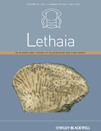
LETHAIA
Unveiling the Mysteries of Life Through TimeLETHAIA, an esteemed journal published by Scandinavian University Press - Universitetsforlaget AS, serves as a vital platform for the dissemination of innovative research in the fields of paleontology as well as ecology, evolution, behavior, and systematics. Established in 1968 and continuing its impactful journey until 2024, LETHAIA has consistently contributed to advancing scientific understanding of Earth's biological and geological history. With a 2023 impact factor placing it in the Q2 category for both Paleontology and Ecology, Evolution, Behavior and Systematics, the journal is recognized for its high-quality, peer-reviewed articles that engage and challenge the academic community. Researchers, professionals, and students alike will find LETHAIA to be an indispensable resource for the latest findings, methodologies, and theoretical advancements in these interlinked disciplines.

Fossil Record
Advancing Knowledge of Earth's Ancient LifeFossil Record is a prestigious open access journal pioneering the field of paleontology, published by Pensoft Publishers in Germany. Since its inception in 1998, it has provided a vital platform for the dissemination of groundbreaking research that advances our understanding of ancient life and environmental change through time. Holding an impressive Q2 quartile ranking in the field and securing a notable position among the top 73rd percentile of paleontological journals, Fossil Record ranks #31 out of 113 in the Scopus classification of Earth and Planetary Sciences. With a commitment to quality and accessibility, the journal not only encourages critical dialogue among researchers, professionals, and students but also promotes the sharing of knowledge worldwide. Explore its comprehensive repository of articles to stay abreast of the latest findings that shape our understanding of the planet’s history.
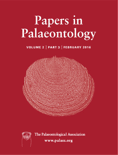
Papers in Palaeontology
Innovative Research, Timeless DiscoveriesPapers in Palaeontology, published by WILEY, is a premier academic journal dedicated to advancing the field of paleontology. With an admirable impact factor and positioned within the Q1 category in Paleontology for 2023, this journal has established itself as a leading platform for innovative research and discussion, ranking 17th out of 113 in Scopus’s Earth and Planetary Sciences category. Since its inception in 2015, Papers in Palaeontology has aimed to publish high-quality, peer-reviewed articles that explore the diversity of ancient life forms and their evolutionary history. Researchers, professionals, and students alike will find valuable insights and rigorous analyses that contribute to the understanding of our planet’s past. Although Open Access options are not available, the journal provides a wealth of knowledge essential for anyone engaged in the study or practice of paleontology, solidifying its importance in shaping future academic discourse.
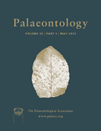
PALAEONTOLOGY
Connecting Past and Present: Insights from Fossil RecordsPALAEONTOLOGY, published by Wiley in the United Kingdom, is a leading journal dedicated to advancing the knowledge of Earth's biological history through the study of fossilized remains. With an ISSN of 0031-0239 and an E-ISSN of 1475-4983, this journal has established itself as a premier resource in the field, boasting a remarkable Q1 ranking in both Paleontology and Ecology, Evolution, Behavior and Systematics according to the 2023 category quartiles. Its commitment to high-quality research is evidenced by its Scopus rankings, placing it in the 93rd percentile among paleontology journals. While PALAEONTOLOGY is not currently open access, its extensive archival reach from 1979 to 2024 ensures that vital research findings remain accessible to the academic community. This journal not only acts as a platform for cutting-edge research but also fosters collaboration among scientists, students, and professionals interested in the implications of paleontological studies on contemporary ecological and evolutionary issues.